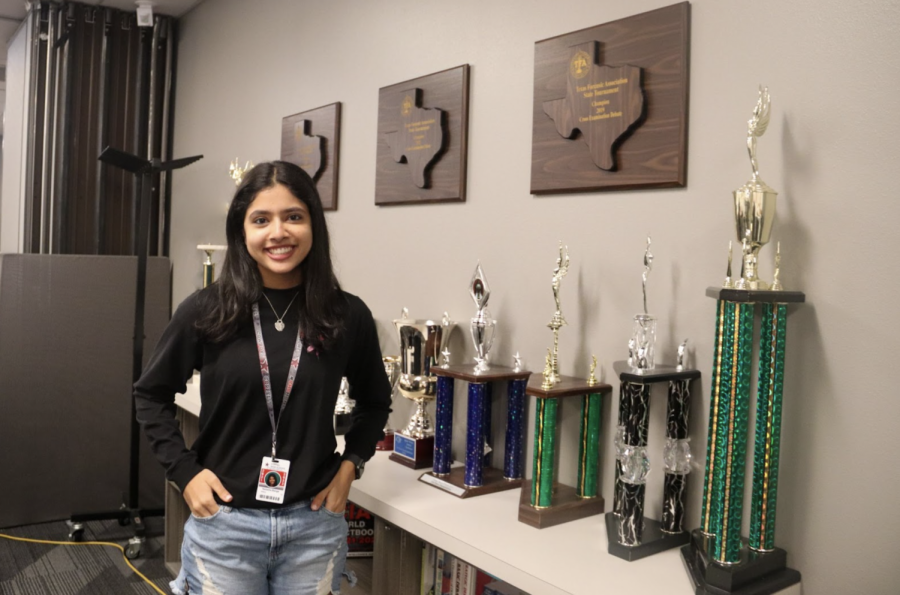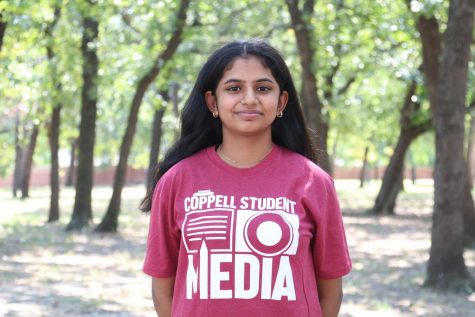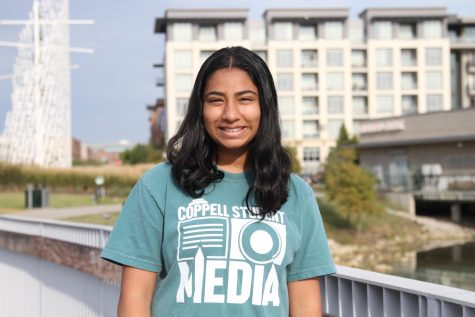Student of the Week: Banga using her voice to excel in debate
Coppell High School senior Natasha Banga has been competing in extemporaneous speaking competitions since seventh grade. Banga has experienced much success in her division by winning awards up to the national level, placing sixth at the 2021 National Speech and Debate Association Tournament.
November 1, 2021
Coppell High School senior Natasha Banga has been very involved in speech and debate since seventh grade and is the president of the CHS American Red Cross chapter. Banga has also worked throughout her high school career to become a National Merit semifinalist and is one of the top 10 ranked students in her class. After high school, she wants to pursue the public policy side of medicine and has been actively working towards her goals by participating in competitive debate, scientific research and advocacy and leadership positions outside of school.
What are some extracurriculars you participate in outside of school?
Outside of speech and debate and the American Red Cross, [which] I am founder and co-president of the club we have at the high school, [and] I volunteer at the regional level [for the American Red Cross]. I have served [as] field ambassador to the national youth council so I represented the northern Texas region at the national level for youth volunteers. I was also involved as a regional executive board member for the North Texas region youth executive board. My main focus is on scientific research; I have been competing in science fairs since ninth grade and got interested in research with my eighth grade research project, which was to explore vision. It was then that I realized I was really interested in making new scientific discoveries and the whole research process overall.
How do you handle school and your extracurriculars together?
The most important thing has just been prioritizing, [and] effectively organizing how I do things. I have normal organizational techniques like a calendar and schedule, but more than just doing that to stay organized is to really prioritize what I need to get done in the short term vs. the long term; because just looking at the mountain of work that you have for the next month or so can be overwhelming. Instead [I] consider what are my top ten priorities for the next week or so. I organize what I need to do in that way considering my tests, tournaments or red cross and then holding myself accountable to those deadlines I set.
Why did you choose debate?
I began debate in seventh grade and I was introduced to this really great speech and debate coach, Ms.Nassar, who had weekly classes at a local church in Coppell, and I think it was really there that I recognized how much I enjoyed speaking. I feel like the first time I actually stood up in front of my class and gave an impromptu speech on some silly topic was really enjoyable, and since then I started to have a lot of success competitively at tournaments and I realized that [debate] was what I wanted to pursue in high school as well.
How has debate shaped you as a person?
On a practical level, I think that it’s made me a lot more sensitive and aware of international issues because what I do in debate specifically, I particularly compete in what’s called international extemporaneous speaking, it focuses on answering very nuanced challenging questions about world issues.
What are you planning on majoring in for college and pursuing as a career?
I’m currently on the pre-med track, so I would like to major in something different like public policy or public health opposed to just biology. Through high school, I explored speech and debate, and having those communication skills and the ability to advocate is very important. Even in the medical field I will continue to pursue a career as a doctor, however, I would ultimately like to get involved more in the public policy side of medicine in organizations like the Center for Disease Control and Prevention or the Federal Drug Administration.
What is your greatest strength and biggest weakness?
My greatest strength would be my ability to communicate. And not just being able to communicate effectively in terms of talking loud and using gestures, but just the willingness to communicate and advocate. As for a weakness of mine, I think at times I can be very much of a perfectionist, a lot of my activities can hinder my ability to manage time. For example, in extemporaneous we have 30 minutes to prepare for a seven minute speech, allocating your time is very important. In times when I am writing my speech I get carried away looking at another statistic or source for my points.
Follow @CHSCampusNews on Twitter.











